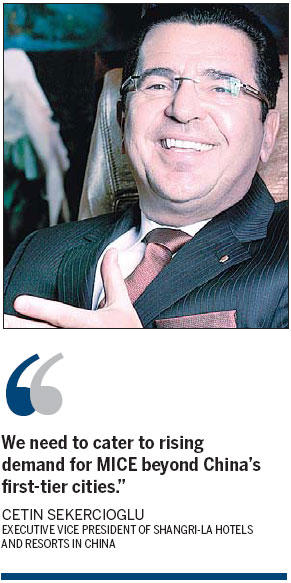In for the long haul

Shangri-La is set to expand as it focuses on catering to business travelers, Matthew Fulco reports in Shanghai.
China's burgeoning travel market, bolstered by rapid urbanization, offers international hotel operators ample room to expand despite rising competition and an anemic global economy.
In 2011, the last full year for which statistics are available, domestic tourist arrivals rose to 2.64 billion and international visitors reached 56.7 million, according to the property consultancy Knight Frank.
Hotels are also eyeing the business-travel market, which is growing as China develops into a leading destination in Asia for the meetings, incentives, conferences and exhibitions (MICE) industry..
"MICE is the bread and butter of our business," says Cetin Sekercioglu, executive vice-president of Shangri-La Hotels and Resorts in China. With more than 130,000 square meters of total meeting space in its properties, Shangri-La offers more meeting capacity than any other luxury hotel group in the Asia-Pacific region.
The company's Kerry Pudong hotel hosts the largest ballrooms in East Shanghai, and Jing An Shangri-La, set to open in June, will have the largest in West Shanghai, says Sekercioglu, who oversees Shangri-La's East and South China hotel portfolio.
Based in Hong Kong, Shangri-La became one of the first international hotel brands to establish a joint venture in China when it opened a hotel in Hangzhou in 1984. Since then, its China portfolio has expanded to 38 properties, with another 30 in the pipeline.
Shangri-La's hotels in Yangzhou and Guilin have brought world-class meeting facilities to those cities, Sekercioglu says.
"We need to cater to rising demand for MICE beyond China's first-tier cities," he says.
The Yangzhou and Guilin hotels are in superb locations, making them ideal for business and leisure travelers, Sekercioglu says.
While most international hotel brands in China act as management companies partnered with local developers, who own the physical hotels, Shangri-La prefers to manage and own its properties outright.
"We take a long-term approach to our property portfolio," says Sekercioglu.
Innovation is a hallmark of Shangri-La's hospitality strategy. This is exemplified in the group's Signature Events program, which utilizes advanced technology and dedicated service to ensure superior results for meeting planners, he says.
"Signature Events is the fruitful outcome of a major research project, from which we were able to design a comprehensive training program that ensures our team members can deliver industry-leading meetings solutions," Sekercioglu says.
















